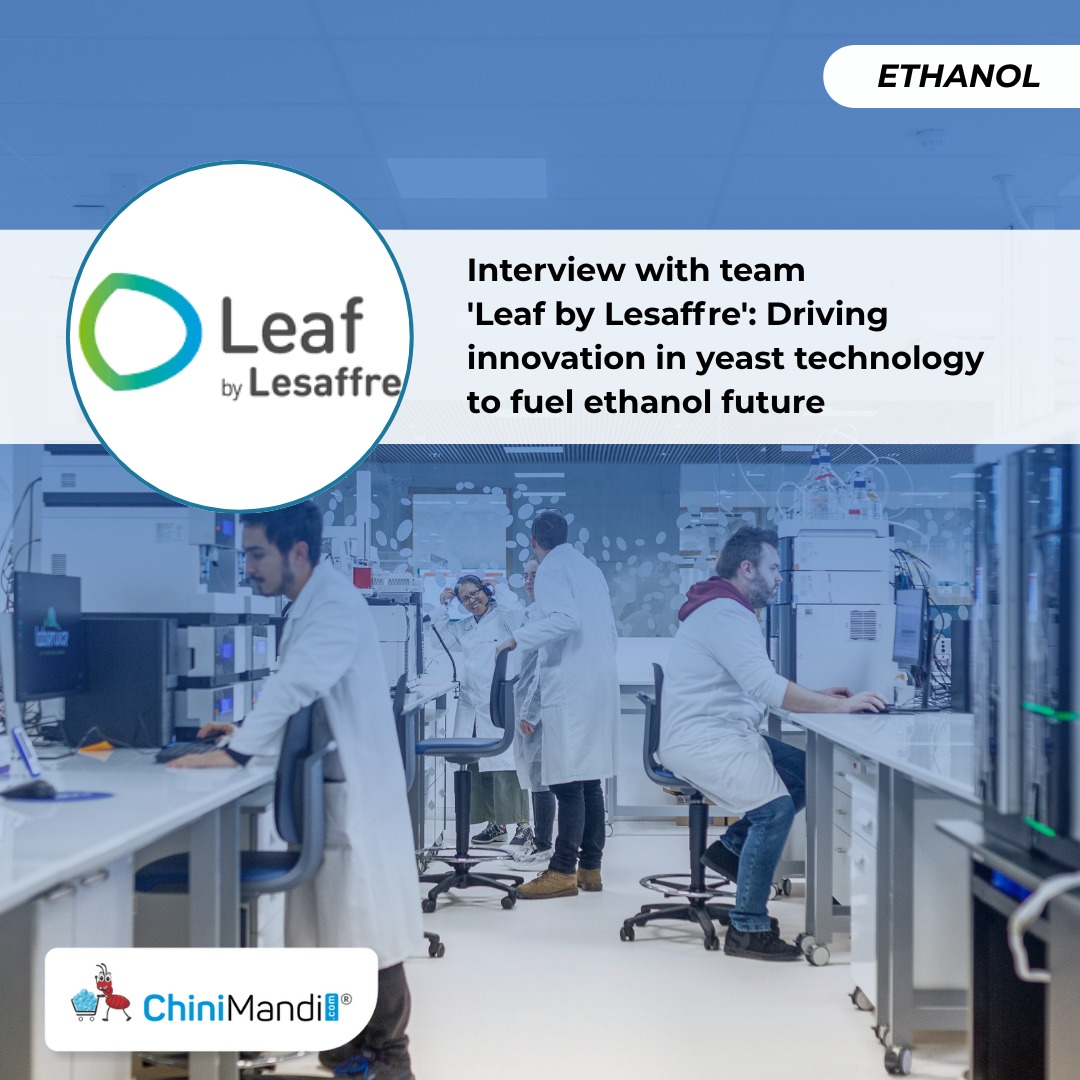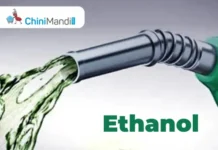Leaf by Lesaffre, a pioneer in yeast technology for ethanol production, is shaping the future of the global biofuels industry. With a history spanning over 170 years, the company has continually innovated and driven efficiency in industrial fermentation. It has been at the forefront of innovation in ethanol production through advanced yeast technology and technical services. Specializing in a wide range of feedstocks, Leaf by Lesaffre plays a significant role in India’s ambitious push for 20% ethanol blending (E20), positioning itself as a key partner in the nation’s biofuels future.
In an interview with Editor Prakash Jha, ChiniMandi spoke with Dr. Marcelo Amaral, General Director; Ms. Chloe Marteel, Marketing & Communication Manager; Mr. Christophe Teste, Technical Support Manager for India & Southeast Asia; and Dr. Sibabrata Mukherjee, Technical Advisor for India. The team shared their insights on the evolving role of yeast in ethanol production, recent technological advancements, and the company’s commitment to shaping a sustainable future for the biofuels industry.

Here are the excerpts from interview:
Q. How crucial is yeast for ethanol production, and what specific role does it play in improving yield and efficiency?
Ans: Yeast contributes to ethanol fermentation’s efficiency by converting maximum available fermentable sugars into ethanol, but practically yeast also produces other metabolites such as acetic acid, glycerol, yeast biomass, higher alcohols such as fusels, etc. Therefore, its efficiency chiefly depends on the choice of yeast strain, which can maximize the conversion of glucose into ethanol while minimizing the production of other by-products under optimum process conditions.
Ethanol yield, on the other end, directly depends on the conversion efficiency and ethanol fermentation efficiency. The higher these efficiencies are, the better the yield will be! Under stress such as high temperature, significant contamination, high osmotic pressure, organic acids and/or suboptimal enzymatic conversion of starch, inadequate yeast may end up lowering ethanol fermentation efficiency and yield. In that sense, choosing the right yeast product, based on its performance characteristics, significantly impacts ethanol yield, fermentation efficiency, and overall process profitability; that is why selecting the right yeast is essential to maximizing ethanol output from available feedstocks.
Q. How does Leaf’s yeast portfolio compare to competitors in terms of ethanol yield, fermentation efficiency, and adaptability to different feedstocks?
Ans: Building on 170 years’ experience in industrial fermentation, Lesaffre is constantly improving its methodology and ability to meet its customers’ needs. At Leaf by Lesaffre, we understand that ethanol producers’ goal is to increase their profitability through high ethanol yield and efficiency. Each plant is unique and has very specific operating parameters, which is why our comprehensive portfolio of yeast products coupled with smart technical services, is designed to support producers in meeting their profitability and production goals. Our proprietary portfolio covers high ethanol yields, performing very high gravity (VHG) fermentations, temperature tolerance, robustness under a wide range of conditions, toxicity tolerance, compensating for nutrient deficiencies goals, as well as an extensive variety of feedstocks to produce ethanol from: corn, rice, cassava, wheat, beet, sugarcane, lignocellulosic biomass, etc. Our technical experts play a pivotal role working with our partners to achieve the common goals of maximizing performance and profitability by providing a unique and tailor-made technical approach.
Q. Have there been any recent breakthroughs in yeast technology that could significantly enhance ethanol production efficiency?
Ans: The ethanol industry has seen exciting advancements in yeast technology in recent years. Novel techniques in strain engineering, like metabolic pathway optimization and genome editing, have unlocked greater levels of ethanol conversion productivity, stress tolerance, and robustness. Advanced yeast strains can be engineered to express enzymes, such as glucoamylase (GA), eliminating the need for exogenous enzyme addition.
As part of Lesaffre, we leverage our large bank of yeast, bacterial, and fungal strains as well as our state-of-the-art facilities, allowing the high-throughput screening, selection, and development of the most relevant microorganisms to produce ethanol. These resources allow us to put on the market advanced yeast being able to withstand harsher conditions, thanks to which industrial ethanol production plants can run with increased efficiency and reduced downtime linked to yeast stress or lack of robustness.
Q. With India’s push for 20% ethanol blending (E20), how can yeast technology help maximize output from available feedstocks while maintaining cost-effectiveness?
Ans: Yeast technology is crucial to meeting India’s ambitious blending targets. Thanks to high-performance yeast strains, ethanol producers can extract the maximum possible ethanol from feedstocks like sugarcane, corn, and lignocellulosic biomass. This will help maximize output without requiring a proportional increase in the feedstock supply, which can be constrained.
Q. Beyond fuel ethanol, how can ethanol companies diversify their co-products to create additional revenue streams and reduce dependency on ethanol alone?
Ans: Ethanol production inherently generates a range of valuable co-products that can be leveraged to create additional revenue streams. These include high-protein animal feed, carbon dioxide for industrial applications, and even specialty biochemicals. By working closely with our customers, we can support them in optimizing their processes and extracting maximum value from these co-products. By diversifying their product portfolios, ethanol producers can reduce their reliance on ethanol alone, improve their overall financial resilience, and contribute to the supply of a wider range of sustainable products.
Q. Is the dual-feed distillery model essential to overcoming feedstock shortages?
Ans: By allowing the use of multiple feedstocks, the dual-feed distillery model is indeed a promising approach to address feedstock availability challenges. With the flexibility to switch between feedstock sources, producers can ensure a steady supply of raw materials and maintain consistent ethanol output. Keeping this in mind, an adaptable and robust yeast product designed to perform optimally across a wide range of feedstocks is an ideal fit for dual-feed distilleries. This adaptability is a key advantage in markets where feedstock availability can be variable.
Q. How is Leaf investing in R&D to drive innovation in ethanol production? What are the key focus areas for research and development?
Ans: Innovation is at the core of our approach, and we have a strong commitment to R&D to drive continuous improvements in ethanol production. Being a part of Lesaffre, a French family-owned company, we draw upon their extensive research, development, and innovation capabilities. Our key focus areas include developing the highest-performance yeast products and solutions supporting today’s and future ethanol production challenges.
Our innovation approach does not stop at the products. We understand that today’s and future industrial fermentation challenges have grown in complexity and that solutions need to be comprehensive and to consider the multiple key parameters at stake for our partners: not only the fermentation part but its connection to customers’ profitability. Products and processes shall be coupled, and the understanding of their mutual interactions is crucial to respond to industrial fermentation’s challenges. In that sense, we are also committed to developing the highest quality services to support plant operations, through on-site technical support, leveraging our proprietary application laboratory in Iowa and a state-of-the-art digitalized monitoring service soon available throughout India.
Q. Is company also focusing on leveraging Artificial Intelligence and other aspects to improve efficiency?
Ans: Absolutely, we are at the forefront of leveraging advanced technologies to drive efficiency in ethanol production. We have dedicated teams exploring the application of artificial intelligence, machine learning, automation, and predictive analytics to optimize every aspect of the process. By harnessing the power of these digital technologies, we support our customers in achieving unprecedented levels of yield, productivity, and cost-effectiveness.
Q. What is Leaf’s long-term vision for the ethanol sector, and how do you see the industry evolving in India and globally?
Ans: We see the ethanol industry as a critical component of the broader bioeconomy, playing a pivotal role in reducing greenhouse gas emissions, enhancing energy security, and fostering rural development globally.
Looking at India specifically, the country set ambitious targets for ethanol blending in gasoline, aiming to achieve 20% blending and even more (E20. This policy push, combined with India’s large agricultural base and growing transportation fuel demand, presents immense growth opportunities for the ethanol sector. To meet such target, India will need to ramp up its ethanol production capacity, which is expected to drive exponential growth in the industry. Factors like the availability of diverse feedstocks, supportive government incentives, and investments in production infrastructure will all contribute to the rapid expansion of the Indian ethanol industry, where Leaf, with its expertise in high-performance yeast solutions and process optimization, is well-positioned to support the transition towards a more sustainable, bio-based economy.
Q. What are the prospects for next-generation biofuels like cellulosic ethanol, and is Leaf investing in this segment? What challenges and opportunities do you foresee?
Ans: The potential of cellulosic ethanol is immense, as it can unlock vast new sources of sustainable feedstock. The challenges of large-scale cellulosic ethanol production are severalfold. The first challenge is the supply of large quantities of raw materials throughout the year. However, under the impetus of favourable regulations, supply chains are being structured. The second challenge is the integration and optimization of all stages of the process to ensure industrial performance and profitability: there is a strong link between the pre-treatment, enzymatic hydrolysis, and fermentation stages. Fermentation toxicity must be limited so that yeasts can develop, and specific care must be taken to work at a sufficient gravity to limit the energy consumption necessary for distillation. Recognizing these challenges, our research programs on fermentation of lignocellulosic hydrolysates started in 2008. Our innovation programs led to the development of CelluX™ our glucose and xylose co fermenting yeast strain. With our ability to deliver functional industrial scale solutions, we are committed to working side-by-side with cellulosic ethanol producers!
Q. Since Leaf is an internationally experienced company, are there any successful strategies from other countries that India can adopt to enhance its ethanol production and biofuels programme?
Ans: Being an international business unit, part of the Lesaffre group, we benefit from a global footprint. Thus, we gained valuable insights from our global experience in the ethanol industry. One key success factor for ethanol production is the implementation of robust policy frameworks that provide long-term visibility and incentives for biofuel production. Countries like Brazil have demonstrated the transformative impact of such policies, driving consistent growth in their ethanol sector. India could consider adopting similar measures, such as guaranteed offtake agreements, tax credits, and investment support, to create a more conducive environment for ethanol producers. Additionally, the development of comprehensive infrastructure for feedstock logistics and distribution can greatly enhance the efficiency and scalability of the biofuels programme. Leaf is committed to sharing our international best practices to support India’s journey towards a sustainable and self-reliant biofuels future.

















